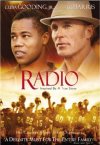BUY THE DVD:
|


|
|
|
SYNOPSIS:
| |
story about the friendship between a football coach and a mentally retarded boy.
|
|
|
MOVIE FACT:
| |
story about the friendship between a football coach and a mentally retarded boy.
|
|
|
RATING:
|


two out of four possible stars
|
|
|
|
In the spirit of musical manipulation of an audience, the makers of Radio have told a very worthwhile story, but seem to have forgotten that the audience is capable of realizing the lessons learned without having that lesson stated out-right via dialogue in the film. And by this I mean a very important phrase that Ed Harris can be heard saying in the trailer: "We haven't been the ones teaching Radio, he's the one that's been teaching us!" While this is a fine sentiment, I don't know that literally spelling the film's message out word-for-word was an intelligent decision by the screenwriters. Did the filmmakers believe that Cuba Gooding Jr., playing the mentally challenged "Radio," would not be able to show the positive effect his character had on the town's people?
Did Harris really have to come out and say this, plain and simple? In the well-known breed of inspirational sports films, there are always certain elements that appear, which are included in order to make the "inspirational" portion come alive. Things like lead character speeches that give the audience goose bumps as the carefully placed orchestral score swells to a crescendo. Montage sequences that show the failure or success of the team (for whatever sport is being highlighted and again, accompanied by an appropriate score). Tears in the eyes of the onlookers, whether they are part of the team or spectators in the stands. These elements are all present in Radio, and the film is quite palatable with their inclusion.
But since it's something that most audience members have seen time and time again, there is a burden placed upon the filmmakers (both actors and crew) to show the audience something unique, or at least something they haven't seen in quite a while. But there's nothing in Radio that sparkles with ingenuity or speaks of real creativity. The film, based on a true story, tells the story rather well, but it doesn't take the audience in a direction they won't be expecting. It's quite easy to guess the outcome of the film, and in many scenes, it's a relatively simple task to predict the exact words that are going to come out of any one of the characters' mouths.
But as the film was based on a true story (footage of the actual man, Radio, appears at the closing credits - much to the film's benefit), perhaps a radical departure from the real-life events would have been insulting to the memories of those who were present during Radio's time at his South Carolina high school. But truthful or not, a great deal of pressure is then placed on the actors, who have to take the audience's interest and keep it snagged for the duration of the picture, even if the audience is fully aware of the film's outcome without the benefit of having seen the film before. And to the cast's credit, Ed Harris and Cuba Gooding Jr. certainly remind viewers why they are lauded as such capable and hard-working actors.
Gooding's lackluster choices in roles aside (did anyone see Boat Trip?), Gooding brings the character of Radio to life in a beautiful way, with subtle humor and believability. And though we've seen Ed Harris's type of character, the honorable and hardworking "Coach Harold Jones," in countless sports film in the past, seeing Harris take on the role can make one appreciate his abilities in front of the camera. Continuously impressive in his roles, Harris plays the role well and true to form. The supporting cast can also be congratulated on strong performances, with Alfre Woodard as the school principal, Debra Winger as Harris's wife, S. Epatha Merkerson as Gooding's mother, Sarah Drew as Harris's daughter and all of the actresses doing their best to improve the humorous 1970's style clothing.
Though viewers should be able to forgive the predictability of the story because of the enjoyable performances, those more alert members of the audience might find the intrusion of the orchestral score (not the pop songs, their place is always welcome) by James Horner seems too contrived in certain scenes of the film. While the score on its own and by itself is well composed, the emotional manipulation dictated by the score is too obvious to be ignored. The filmmakers seemingly had the desire to "help" the actors by inflating their performances with appropriate musical cues. But with the caliber of performances in Radio, this dramatic nudging was not needed.
Review by Kelsey Wyatt.
| |
|